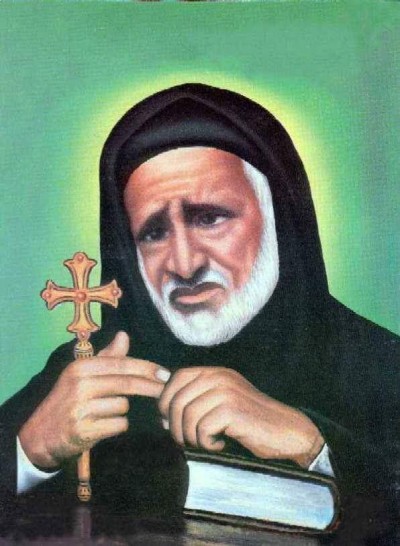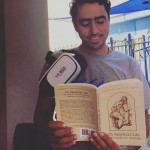The blessed father Abdel Messieh el Macarii was born in 1892 in the village of Abu Shehata, district of Mattai in the provience of El Minya. His father's name was Henain and his mother's was Estere. When he grew up he wanted to be a spiritual soldier in the army of celibates, so he gave …
The blessed father Abdel Messieh el Macarii was born in 1892 in the village of Abu Shehata, district of Mattai in the provience of El Minya. His father’s name was Henain and his mother’s was Estere. When he grew up he wanted to be a spiritual soldier in the army of celibates, so he gave his back to the world and headed for the monastery of St Samuel on the Qalmon mount, but his father went to the monastery and took him back home. This happened many times, and every time his father brought him back from the monastery a great number of his livestock died. At last his father left him alone after the saint promised him that God will give him another son at his old age to help him with the work, so he went and became a monk at the monastery of St Macarius the great in the wilderness of Sciete, in the Natron valley. He led an extremely ascetic life and became a highly regarded model of true monastic life.
Later he went to the village of Manahra to serve as a priest of the village, as advised by his confession father, where The Lord honoured him with the gift of foreseeing the unknown. He was able to perform signs and miracles at the same magnitude as those of the apostles. He was keen to conceal those gifts with some unusual gestures.
The Fool and Insane Saint:
After he had advanced to a very high spiritual standard of holiness, our saintly father choose to hide his virtues following the saying of one of the saints, “If virtue becomes manifest, it would be stolen and plundered through vain glory.” For this reason the saint pretended insanity and idiocy in his speech and in his actions, to stop people from gathering around him and from praising him. He sometimes used expressions quite peculiar to the monastic conduct e.g. “I want to get married.” Some people started to have doubts about him, some even decided to test this request.
They said, “We snared him in order to ascertain whether he was serious when talking about marriage, but at the same time we safe guarded the women we sent to him. We had to protect our honour.” They concluded, “The purity and sanctity of the saint were proven beyond any doubt. He never yielded to the lady and was able to get rid of her with some mad actions.”
To mention an example I relate the following incidents:
In 1956 I was visiting the saint at Manahra, he asked to marry an elderly woman named Mostafia who was quite familiar to the saint’s actions. He asked me to go with him to the woman’s house and asked Father Yohanna Soliman, the priest of Manhr’s Church, to issue the marriage certificate.
Father Yohanna was fearful that Met. Athanasuis, the late metropolitan of Beny Sewaif might expel him from the priesthood. Seeing Father Johanna’s disbelief I asked him to bring a copy of an old marriage certificate just to get to the end of the play. Father Yohanna went to get the copy from the house of the Church’s Rector. He came back after obtaining the certificate, but of an old marriage certificate. When they arrived at Fr Abdel Messieh’s cell, accompanied by a deacon named Salib Wahba. Salib saw the saint’s fingers emitting light while praying in his cell. It was about nine in the morning, he screamed saying to Father Yohanna, “Look! Father Abdel Messieh’s fingers are luminous.” Fr Yohanna looked, it was true. I saw him I was terrified, and in a state of sever panic he told us what he had seen.
The saint was still determined to carry on with the play of getting married, and in spite of what had happened we were inclined to believe the whole thing to be a dead serious matter. Moments later the spiritual son of the saint, Mr. Makram Hanna, joined us. I said to him, “Please Makram, you know very well the character of this man, do us a favour and help us get out of this predicament.” I said that because I had only recently become acquainted with the saint.
Makram addressed the saint saying, “Listen to me Father Abdel Messieh; according to the new regulations set by the government, a marriage contract can be executed only by a registrar authorized by the government and Father Yohanna does not have this capacity. The saint put on angry act and went out shouting, You just want to upset me. You love me to hinder my marriage, give me my money back for I have changed my mind, I am not going to get married.” That was the end of the play.
The Saints Charity:
Almost all Manahra’s population stated that the saint gave the poor and the needy everything he had received through the generosity of some kind people. Even in giving alms he had his own way which relied on the pretence of folly. For example he may gather some orphan children claiming that he wanted them to do a job for him.
He may ask them to locate some abnormal persons, and after a few minutes in a vain search he would ask them to sing, “The black monk is a beggar”. Being shy they would whisper these words, so he would dismiss them since they could not find any abnormal people. He would then pay them for their efforts.
The late Mr Girgis, once said to me, “Whenever the saint knew, by the spirit, that I had been in financial strife he would call me requesting that I find the fictitious person around the water canal (which was one meter deep and two meters wide). I would cross the stream and come back saying that I couldn’t find any fictitious persons. He would then say “alright, you can go now, and here is your wage.”
It is quite obvious that the saint wanted to give alms in a masked way, under the pretence of folly and insanity and without boasting in compliance with Lord Christ’s teaching, ” … but when you do a charitable deed, do not let your left hand know what your right hand is doing, that your charitable deed may be in secret and your father who sees in secret will Himself reward you openly” (Matt 6:3-4).
Finally, he reposed in the Lord on the morning of Easter Sunday, the 14th April 1963 May the blessings of his prayers be with us all. Glory be to our Lord forever and ever Amen.
By: Met Mina of Gerga
A disciple and a biographer of the saint
Join Us: Sign Up Today!
Tags:











